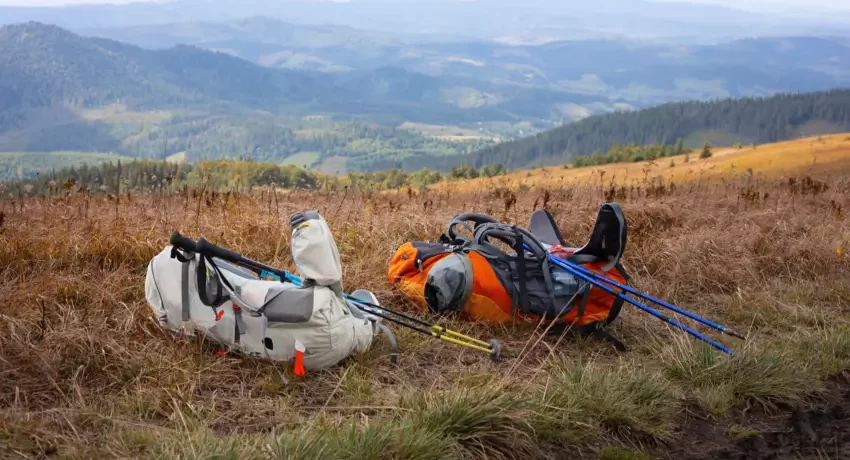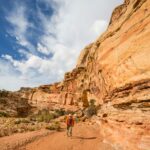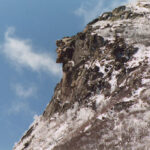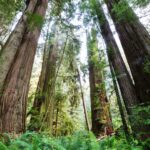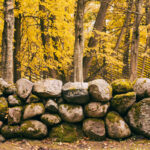Excess only weighs you down.
This may sound like commentary on our culture of consumerism. A “less is more” outlook on life.
But for a backpacker, it’s the plain-spoken truth: Every item in your backpack — from snack bars and freeze-dried meals to sleeping bags and socks — will weigh you down.
Once you set foot on that trail, minimalism is no longer a choice but a necessity.
That’s part of what makes backpacking such a profound experience. Temporarily departing from the excess of modern life, we get the chance to rewind the clock and live simply – using only what we need and working with only what we have.
As our lives become more complex, and with Covid fueling more outdoor time, perhaps it’s no wonder that backpacking continues to surge in popularity.
According to the Outdoor Foundation’s Outdoor Participation Trends Report, 10.3 million people in the U.S. went backpacking in 2022.
Not only does backpacking let us experience the natural world in its unspoiled glory, it also gives us insight into our relationship with material possessions.
On the trail, it’s just you and the companion on your back: An austerely minimal unit of existence. It bruises your hips, digs into your shoulders and leaves a trail of sweat down your back. But it’s all you’ve got. And, at the end of your trip, you realize it’s all you need.
For days or even weeks on end, we traverse a wilderness expanse using only what we can carry on our back. It’s paradoxical: The very thing that weighs us down also liberates us.
Here are five ways that backpacking can bring clarity into our lives, connect us with the natural world, and help us better understand what we really need.
1. Backpacking inherently promotes minimalism
Ounces equal pounds and pounds equal pain. This timeless adage — used by Marines and thru-hikers alike — perfectly captures a backpacker’s dilemma.
When you strap on that oversized monstrosity, it becomes abundantly clear that each unnecessary item you’ve stuffed into your backpack will significantly impact your experience. Every item that goes unused — aside from important emergency items like satellite phones and medkits — over the course of your trip will slow you down and leave your shoulders, hips and knees that much sorer.
This balancing act forces us to critically assess our needs and consider the value that each item crammed into our bag brings to us.
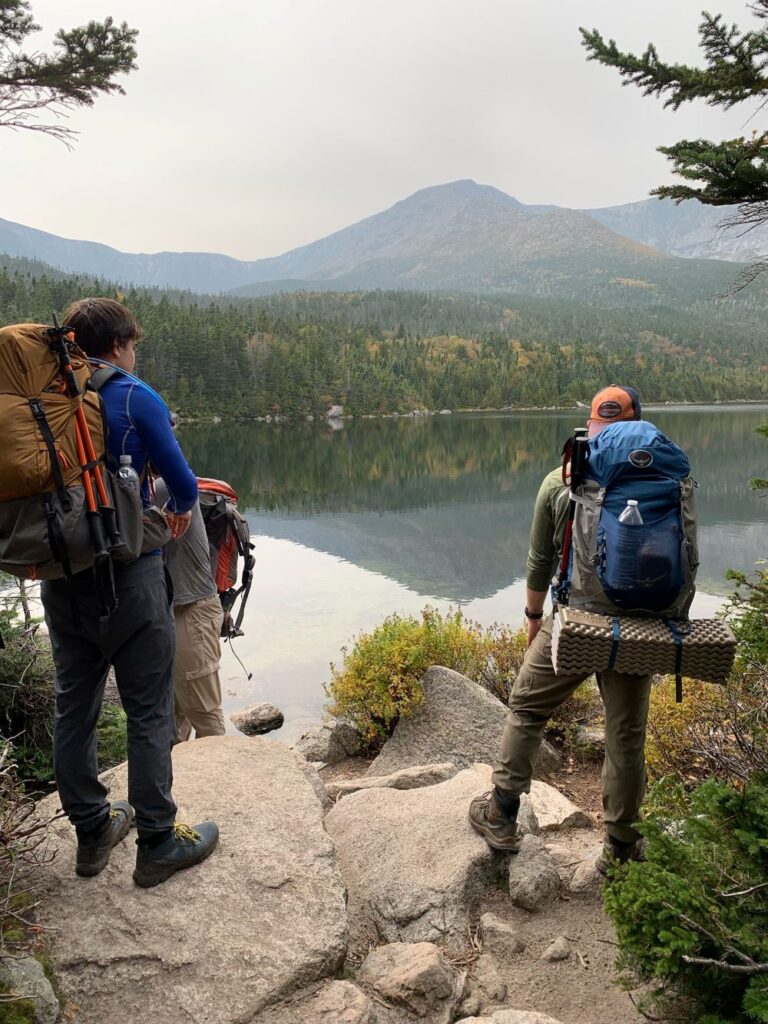
2. Backpacking promotes utilitarianism
The limit on how much we can carry in our backpacks will encourage us to adopt creative utilitarianism.
It’s no wonder that multi-tools, paracord, duct tape and bandanas – often referred to as APs or “all-purposes” – are our best friends on the trail. They’re versatile tools that can be combined in creative ways to fill the gap between what we have and what we need in-the-moment.
When heavy winds and rain sent a tree-branch crashing through my tent’s canvas, a healthy dose of duct tape kept my ripped tent sealed from an onslaught of rain. When I slipped atop Katahdin’s infamous Knife’s Edge trail and split my hand open on a rock, my bandana kept the wound wrapped-up and clean. When my backpack’s strap tore under the absurd weight of 9-days worth of food, supplies, and shelter, I used a paracord to reinforce the strap.
During your trek, you’ll likely be miles from cell service and even further from the nearest town. There’s no overnight shipping (well, at least not for now) and no YouTube tutorial to bail you out. You’ll utilize what you have and find creative solutions to problems on the fly. For the first time, perhaps in a long time, the resources at your disposal are limited.
Don’t worry. You’ll be surprised by your own creativity and ability to problem solve and adapt. By forcing you to think critically, backpacking boosts your self confidence and fosters a sense of self-reliance.
3. Connecting us with the natural world
The cacophony of traffic. The confines of concrete. The artificial glow of city lights and screens. Like the layers of an onion, every step we take along the trail peels away a layer of modern life.
Far from the noise, we’re given the chance to connect with our wild origins.
At times, the trail — perhaps the most rudimentary form of human infrastructure — is our only reminder that a human-centric world exists beyond the pristine natural landscape that we find ourselves in.
In this setting, it’s hard not to feel connected to the natural community that surrounds us. The unspoiled natural world is a gift — we must treat it kindly to preserve its beauty.
It’s no wonder that backpacking inspires environmental advocacy. Witnessing the beauty and fragility of natural landscapes will motivate us to support conservation efforts and promote sustainable practices.
To minimize our impact on the environment, many backpackers strictly adhere to principles of Leave No Trace. Every social trail that we create tangibly changes the landscape. Next time you find yourself on a trail, pay attention to every widened section that previous hikers created in order to divert around puddles or water-logged areas.
For fragile, ground-hugging alpine plants, it can take years to recover from being trampled by hikers who are looking for a better view from the summit. In the desert, hikers’ footprints can crush cryptobiotic soil, commonly referred to as biological soil crust, which are communities of living organisms on the soil’s surface. Once this delicate, sponge-like soil is compacted, it can take years or even decades to recover. Impacted areas experience accelerated erosion and nutrient loss.
On the trail, we become stewards of the land. Every backpacker has shared a responsibility and commitment to stay on trail and keep the places we explore wild.
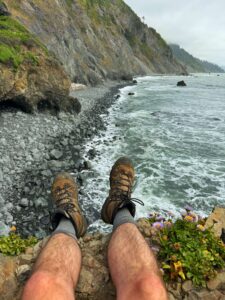
4. Confronting our consumption
Pack it in, pack it out. The idea behind this slogan is that backpackers and hikers are responsible for carrying out any food or supplies that they bring with them, as opposed to leaving them behind as litter.
This tenet of backcountry travel makes us confront our consumption by forcing us to carry every piece of trash that we produce throughout a trip. Every snack bar wrapper, instant noodle packet, zip-lock bag and baby wipe piles up in our designated trash bags.
Rather than throwing garbage into a trashcan — where it will be out of sight and out of mind — we carry it with us. The items in our growing bags of waste and single-use plastics may take centuries to break down.
Backpacking puts into perspective just how much plastic we throw away every day and highlights the importance of finding sustainable and reusable solutions.
5. Slow. Down.
Most of our days are an endless list of To-Dos: Commutes, meetings, schedules, deadlines, dates, relationships, repairs, appointments and more. Our lives are complicated.
Backpacking is not.
On the trail, our list of priorities is refreshingly simple: Eat, sleep, hydrate, walk.
When we wake, there’s no endless feed of entertainment and news to keep us stimulated. As we sit by a stream to fill up our water for the day, there are no distractions. As we hike through meadows, forests and canyons, no billboards, advertisement pop-ups or storefronts vie for our attention. Free from the need to multitask, we can be mindful and present.
Perhaps for the first time in years, we voluntarily free ourselves from distraction. The mind may wander, but the path is inherently deterministic: Follow the trail step after step, mile after mile.
Our shortened list of daily priorities makes each task feel more intentional and consequential.
While filtering water, listen as the stream burbles over rocks and swooshes around roots. As you admire the chorus of life that surrounds you and consider the life-giving resource that rushes past your hands, gratitude and awe are sure to rush over you, too.
Get out there and try backpacking for yourself
Intrigued by backpacking and want to give it a go? Here are some great itineraries for beginners. To get the latest backpacking tips, tricks and itineraries, subscribe to our monthly newsletter.

